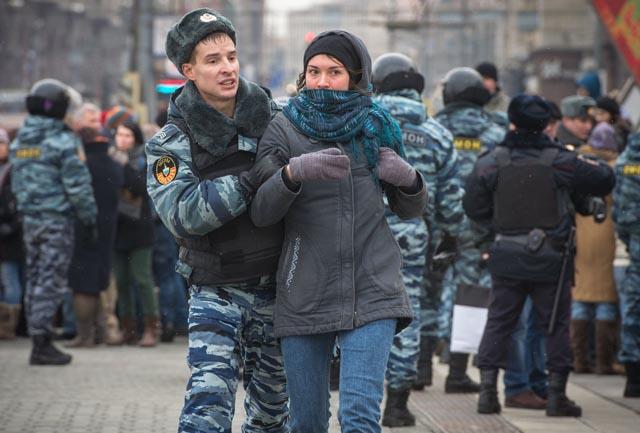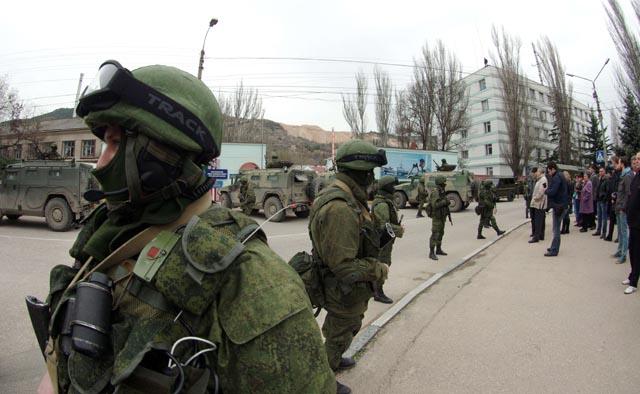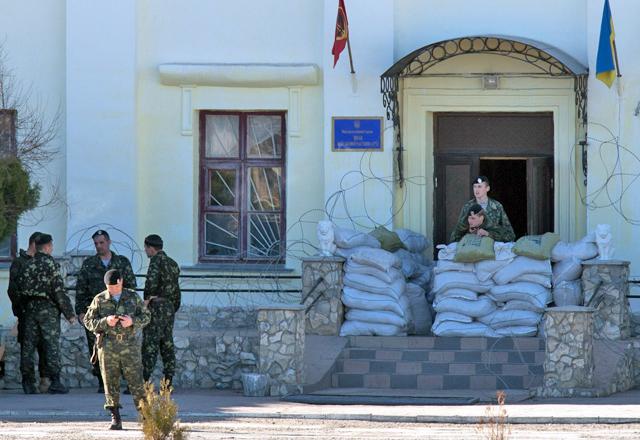You are here
Russian troops flood into Crimea; markets plunge
By AFP - Mar 03,2014 - Last updated at Mar 03,2014

KIEV — Ukraine accused Russia on Monday of pouring more troops into Crimea as world leaders grappled with Europe’s worst standoff since the Cold War and the Moscow market plunged on fears of an all-out conflict.
Russian Foreign Minister Sergey Lavrov said forces were needed in the flashpoint Black Sea peninsula until “the stabilisation of the situation” in the ex-Soviet nation and slammed Washington’s “unacceptable threats” against Moscow.
Crimea — the strategic host to tsarist and Kremlin navies since the 18th century — has been under de facto occupation by Moscow-backed forces since President Vladimir Putin won parliament’s authorisation on Saturday to send troops into Ukraine.
The price of oil surged over fears of a conflict while the Moscow market lost more than 12 per cent on a Black Monday of trading that saw the ruble establish historic lows.
British Foreign Secretary William Hague warned Russia of “consequences and costs” as he met Ukraine’s Western-backed but untested interim leaders in Kiev.
The world’s richest nations have already threatened to strip Moscow of its coveted seat at the Group of Eight for menacing its ex-Soviet neighbour.
But Europe and Washington appear to have limited options in dealing with Putin — a veteran strongman with mass domestic appeal who has cracked down on political freedoms and appears more interested in rebuilding vestiges of the Soviet Union than repairing relations with the West.
Ukraine has soared to the top of the global agenda even as the brutal conflict in Syria rages and talks on Iran’s nuclear drive enter their most sensitive stage.
“This cannot be a way in the 21st century to conduct international affairs,” Hague told reporters. “It is not an acceptable way to behave and there will be consequences and costs.”
The crisis on the eastern edge of Europe threatens to blow up into the biggest test to global diplomacy since the fall of the Berlin wall.
It first erupted in November when protests began against the pro-Kremlin regime over its scrapping of an EU pact and culminated in a week of carnage last month that claimed nearly 100 lives and saw the downfall of president Viktor Yanukovych — now living in exile in Russia.
“There was the [1962]Cuban missile crisis and the Soviet Union’s decision to send tanks into Prague [in 1968]. But in that era, we were effectively in a state of war,” said Alexei Malashenko of the Carnegie Moscow Centre.
Germany offered a rare glimmer of hope by announcing that Putin had agreed in telephone talks with Chancellor Angela Merkel Sunday to set up a contact group on Ukraine.
Western allies in NATO also said they wanted to send international observers to Ukraine while engaging Moscow in direct talks.
Washington added it would like to see a mission from the Organisation for Security and Cooperation in Europe deployed in the nation of 46 million “immediately”.
‘Attacking human rights’
Russia offered no immediate response to any of the proposals — all backed by interim leaders in Kiev who are trying to pull Ukraine closer to the European Union after replacing the Yanukovych regime.
Lavrov said Kiev’s new leaders “intend to make use of the fruits of their victory to attack human rights and fundamental freedoms... of minorities”.
Crimea is now almost under complete control of Russian forces and local pro-Moscow militia who patrol both government buildings and the perimeters of Ukrainian barracks on the rugged Black Sea peninsula.
“All military bases in Crimea are blocked,” regional defence ministry spokesman Stanislav Seleznyov told AFP.
“All of the bases in Crimea are still under Ukrainian control. But they are surrounded,” the Ukranian defence official said.
The precarious situation for Kiev’s new leaders was underscored Sunday when Ukrainian navy commander Denis Berezovsky announced just a day after his appointment that he was switching allegiance to the pro-Russian authorities in Crimea after troops surrounded his building and cut off the electricity.
Crimea’s pro-Kremlin government chief Sergiy Aksyonov — appointed on Thursday after an armed raid on the region’s government building but who is not recognised by Kiev — immediately named Berezovsky as head of the peninsula’s own independent navy.
Ukraine’s Prime Minster Arseniy Yatsenyuk warned at the weekend that Ukraine was “on the brink of a disaster” and said any invasion by its vast eastern neighbour would mean “war”.
Market jitters
The first business day since Russian senators authorised Putin to use force against Ukraine on Saturday saw Asian and European markets drop sharply and the Moscow exchange lose over 13 per cent.
Russia’s central bank unexpectedly hiked its main interest rate to 7 per cent from 5.5 per cent in a bit to halt a meteoric ruble decline that saw it hit record lows again the dollar on Monday.
Brent North Sea crude for April jumped $1.69 to $110.76 while New York’s main contract — West Texas Intermediate (WTI) — for April delivery gained $1.36 to $103.94 in Asian trade.
“A situation is emerging that could have profound circumstances for many major Russian companies,” Moscow’s Nord Capital financial advisory said in a research note.
Shares in Russia’s natural gas giant Gazprom tumbled by 12.5 per cent on uncertainty about whether the state-controlled company may be ordered to halt deliveries to Ukraine — and by consequence Western Europe — as a punitive step by the Kremlin against the new Kiev team.
“Europe [and Turkey] will likely strengthen their efforts to become less dependent on Russian energy,” Hamburg’s Berenberg Bank economist Holger Schmieding said in a research note.
G-7 condemns Russian ‘violation’
The White House on Sunday released a statement symbolically signed by the G-7 biggest industrialised nations — an economic grouping that unlike the G-8 excludes Moscow — condemning “the Russian Federation’s clear violation of the sovereignty and territorial integrity of Ukraine”.
The G-7 ministers promised “strong financial backing” that US Treasury Secretary Jack Lew said would probably be delivered through a programme overseen by the IMF.
US Secretary of State John Kerry also warned ahead of his arrival in Kiev on Tuesday that Moscow risked losing its G-8 seat over its “brazen act of aggression” in Ukraine.
Analysts believe Ukraine would face a David-and-Goliath struggle should the conflict escalate.
Russia’s army of 845,000 soldiers could easily overwhelm Ukraine’s force of 130,000 — half of them conscripts.
But Matthew Clements of Jane’s Intelligence Review also noted that “if the Ukrainian forces remain unified... they have some chance of holding Russia back in a full-combat situation for a considerable time”.
Related Articles
Ukraine warned Sunday it was on the brink of disaster and called up military reservists after Russia’s threat to invade its Western-leaning neighbour risked sparking the worst crisis since the Cold War.
Russian President Vladimir Putin won the green light from parliament Saturday to send troops into Ukraine after a bloody three-month uprising that swept new pro-EU leaders to power but sparked unrest in the pro-Kremlin Crimean peninsula.
Ukraine’s Western-backed leaders voiced fears on Sunday of an imminent Russian invasion of the eastern industrial heartland following the fall of their last airbase in Crimea to defiant Kremlin troops.














